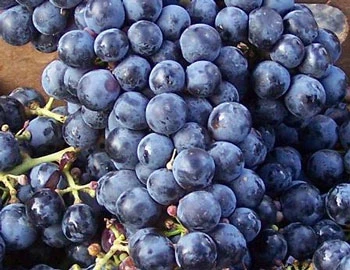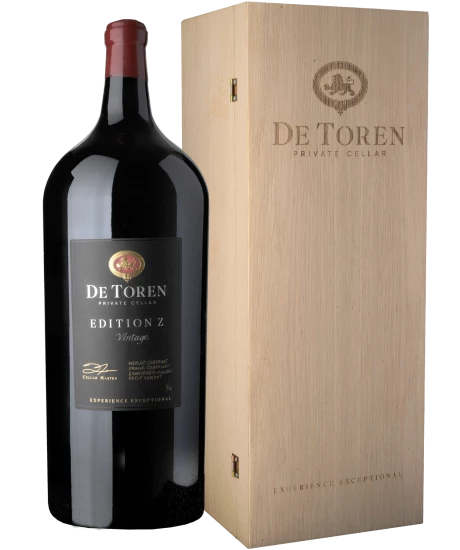Edition Z 2018
Edition Z 2018
Stellenbosch, De Toren, 9000 ml
Description
The New World at its best. "Z" is the affectionate name for this cuvée, alluding to the fresh Zephyr breeze that cools down the vineyards facing the sea. Ideal conditions for the classic Bordeaux varieties from which this red South African is made. It is an expressive wine with rich red fruit, very balanced on the palate with a round, strong, velvety tannin structure. The high Merlot content gives it its charm, the Cabernets contribute spicy pepperoncino notes, an elegant acidity characterises the palate. We recommend decanting it!
Attributes
| Grape variety: | Merlot, Cabernet Franc, Cabernet Sauvignon, Malbec, Petit Verdot |
| Producer: | De Toren |
| Origin: | South Africa / Coastal Region / Stellenbosch |
| Other bottle sizes: | 375 ml 750 ml 1500 ml 3000 ml |
| Ripening potential: | 3 to 15 years |
| Drinking temperature: | 15 to 18 °C |
| Food Pairing: | Spiced grillades, Wild fowl, Bistecca fiorentina, T-Bone steak, Saddle of lamb fillet with herb jus |
| Volume: | 14.5 % |
| Note: | Contains sulphites |
Petit Verdot
Bordeaux’s secret weapon
It is commonly said that the Petit Verdot originated in Bordeaux. But genetically, it is closer to a group of vines from near the Pyrenees, which are most likely descended from wild clematis. In French, these wild plants are called “lambrusques”, and the Petit Verdot is also known under the synonym Lumbrusquet. It is a high quality grape: very dark and spicy with notes of cassis and graphite, plenty of robust tannins and strong acidity. Most major Bordeaux contain a small proportion of Petit Verdot. Appropriately, it is valued wherever wines are produced according to the Bordeaux recipe. For example, in Italian Maremma or in California, where it covers the largest area worldwide. It is almost never vinified purely by itself. Incidentally, its name, derived from “vert”, meaning green, alludes to its Achilles heel: in cool weather it tends to form small, seedless green grapes.
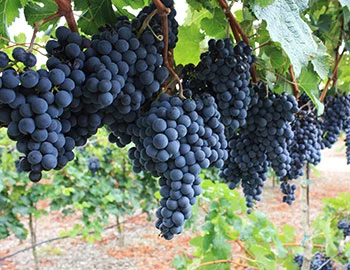
Merlot
Everybody’s darling
Merlot is the most charming member of the Bordeaux family. It shines with rich colour, fragrant fullness, velvety tannins and sweet, plummy fruit. It even makes itself easy for the vintner, as it matures without issue in cool years as well. This is in contrast to the stricter Cabernet Sauvignon, which it complements as a blending partner. Its good qualities have made the Merlot famous worldwide. At over 100,000 hectares, it is the most-planted grape in France. It also covers large areas in California, Italy, Australia and recently in Eastern Europe. The only catch is that pure Merlot varieties rarely turn out well. Its charm is often associated with a lack of substance. Only the best specimens improve with maturity. They then develop complex notes of leather and truffles. This succeeds in the top wines from the Bordeaux appellation of Pomerol and those from Ticino, among others.
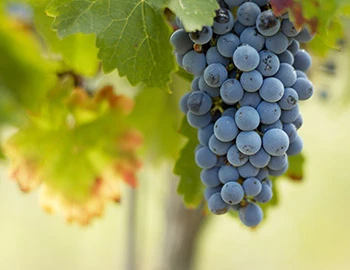
Cabernet Sauvignon
The backbone of Bordeaux
The Cabernet Sauvignon gives the Bordeaux its backbone, yielding deep violet wines with powerful tannins and endless ripening potential. It is the top dog in Médoc, and is placed in all five premier crus of Bordelais. When young, it often appears strict and unapproachable, but with advancing years, its tannins round off. It is wonderfully velvety, and yet always maintains its freshness. Typical flavours include cassis, graphite and cedar. Wherever Cabernet Sauvignon is found, Merlot is not far away. It complements the robust structure of Cabernet with softness, fruit and richness. The Cabernet Sauvignon is the most-exported vine in the world. It delivers persuasive qualities in Italy as an ingredient of the Super Tuscan, or as the flagship variety from California. There, it is lovingly titled “Cab Sauv”. Meat fans should be aware that it fantastically accompanies a grilled entrecôte. The family tree of Cabernet Sauvignon is surprising: its parents are Cabernet Franc and the white Sauvignon blanc.
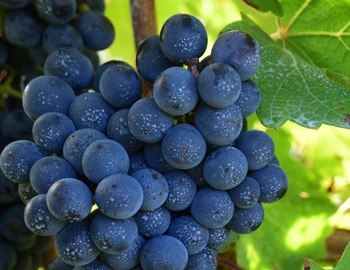
Malbec
New Home, New Fortune
The Malbec once belonged to the classic assortment of varieties from Bordeaux. But it was demanding to cultivate, and in the changeable climate of the Bordelais it often became green and herbaceous, so winemakers replaced it with Merlot in the middle of the 20th century. Luckily, the Malbec found a new home in Argentina. In 1868, a Frenchman brought the first stocks along to the land of the Andes. Today, the Malbec is the most-planted variety there. Especially in Mendoza, it shows what it can do: it yields very dark, well-structured wines with aromas of black fruit, violets and game. They just call out for an Argentinean steak! The Malbec has its origins in Cahors, in southwestern France. There, it is kept today under the name Cot. Due to their earthy tannins, in the middle ages the growths from this area were also called "the black wines of Cahors".
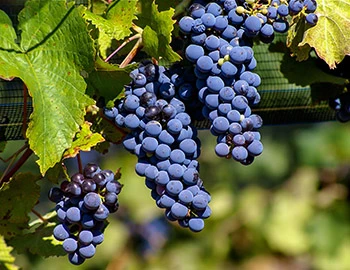
Cabernet Franc
Forefather of the Bordeaux varieties
The Cabernet Franc is one of the oldest varieties of Bordelais and a parent of three other red grapes in the Bordeaux assortment: Cabernet Sauvignon, Merlot and Carmenère. It is distinguished by its complex, flavourful bouquet of raspberry, graphite, violet, liquorice and white pepper. In addition, it presents round, crisp tannins which turn out less strongly than those of Cabernet Sauvignon. While the Cabernet Franc always appears as part of a blend in Bordeaux, it is pressed alone on the Loire. The most renowned appellations are Chinon and Bourgueil. Incidentally, the Cabernet originates not in Bordeaux but in the Spanish Basque Country. Cabernet owes its name to the Latin “carbon”, meaning black.
